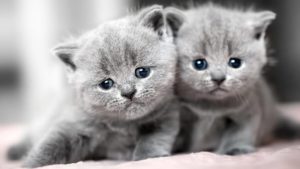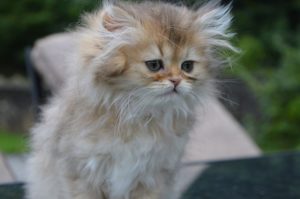In this comprehensive guide, we will explore the weight chart for British Shorthair cats, highlighting the ideal weight range for both male and female cats at different stages of their lives. We will also discuss how to determine if your British Shorthair is overweight and provide tips on maintaining a healthy weight for your beloved feline companion.
What Weight Should My British Shorthair Be?
British Shorthair kittens experience significant growth in their first year of life. During this phase, their weight can vary greatly. On average, British Shorthair kittens weigh between 3 to 4 pounds. As they mature into adults, their weight can range anywhere from 9 to 17 pounds, and in some cases, even higher.
It’s important to note that male British Shorthairs are generally larger and heavier than their female counterparts due to their genetic makeup. Male kittens typically mature more quickly and put on more weight than female kittens. However, each cat is unique, and various factors such as genetics, diet, activity level, and gender can influence their weight.
To better understand the weight progression of British Shorthair kittens, let’s take a closer look at their growth patterns.
British Shorthair Kitten Weight Chart
British Shorthair kittens have a predictable weight development pattern. When adopting a 12-14-week-old British Shorthair kitten, they will typically weigh around 3 to 4 pounds. Over the next two months, they will gain approximately one pound per month. However, after 6 months, their growth rate slows down, and weight fluctuation becomes less likely.
By the time your British Shorthair kitten reaches 12 months, they will have gained enough weight to support ordinary growth. On average, they will weigh around 9 to 10 pounds at this stage. It’s important to note that these weight ranges are general guidelines, and individual cats may vary.
Female British Shorthair Weight
Female British Shorthair cats generally weigh less than their male counterparts. While the weight chart for female British Shorthairs follows a similar pattern as males, their overall weight is typically lower. It’s crucial to monitor your female British Shorthair’s weight regularly to detect any potential nutritional deficiencies or health issues.
Obesity can be a concern for British Shorthair cats, as excess weight can lead to various health problems. Female British Shorthairs should ideally weigh between 9 to 12 pounds, depending on their age and build.
Male British Shorthair Weight
Male British Shorthairs tend to be larger and heavier than females. They reach their maximum growth potential earlier than females, usually within the first year of life. However, some cats may continue to grow until they are three to five years old.
During the growth phase, male British Shorthairs may experience noticeable changes in their body structure. Around the sixth month, they may exhibit signs of sexual behavior and scent marking. By the seventh month, they will resemble adult cats, albeit slightly lankier. Their muscles will continue to develop, and they will gradually gain weight.
On average, male British Shorthairs weigh around 12 to 17 pounds, but this can vary depending on various factors. It’s essential to provide them with a balanced diet and monitor their weight to prevent obesity-related health issues.
How Do I Know If My British Shorthair Is Overweight?

Maintaining a healthy weight is crucial for the overall well-being of your British Shorthair. However, determining if your cat is overweight requires more than just a visual assessment. To accurately assess your cat’s weight, it’s advisable to consult a veterinarian, who can provide professional guidance based on your cat’s specific needs.
That said, there are some general signs that can indicate if your British Shorthair is carrying excess weight. These signs include:
-
Difficulty Feeling Ribs: If you struggle to feel your cat’s ribs when gently running your hands along their sides, it may indicate they have excess fat covering the ribcage.
-
Lack of Waist Definition: A healthy cat should have a visible waistline when viewed from above. If your cat appears rounded without a distinct waist, it may suggest they are overweight.
-
Low Energy Levels: Obesity can lead to reduced energy levels and overall lethargy in cats. If your British Shorthair seems less active than usual, it’s worth considering their weight as a possible contributing factor.
-
Difficulty Grooming: Overweight cats may struggle to groom themselves effectively, resulting in a lackluster coat and potential skin issues.
If you suspect that your British Shorthair is overweight, it’s crucial to address the issue promptly to prevent further health complications. Consult with your veterinarian to develop a suitable weight management plan tailored to your cat’s specific needs.
Maintaining a Healthy Weight for Your British Shorthair cats
Preventing obesity and maintaining a healthy weight is essential for the overall well-being of your British Shorthair. Here are some tips to help you keep your furry friend in optimal shape:
1. Balanced Diet
Providing your British Shorthair with a balanced and nutritious diet is crucial for their overall health. Opt for high-quality cat food that meets their specific dietary requirements. Look for products that contain high levels of protein and essential nutrients while avoiding fillers and unnecessary additives.
2. Portion Control
Feeding your British Shorthair the appropriate portion sizes is vital to prevent overeating and weight gain. Follow the feeding guidelines provided by your veterinarian or the cat food manufacturer. Avoid free-feeding and instead establish a consistent feeding schedule.
3. Regular Exercise
Encouraging regular exercise is essential for maintaining a healthy weight and promoting overall well-being. Engage your British Shorthair in playtime activities that stimulate their natural hunting instincts. Provide them with toys and interactive games that encourage physical activity.
4. Monitor Treat Intake
While treats can be a great way to bond with your British Shorthair, it’s important to monitor their intake. Excessive treat consumption can contribute to weight gain. Opt for healthy treats and limit their quantity to avoid overindulgence.
5. Veterinary Check-ups
Regular veterinary check-ups are crucial for monitoring your British Shorthair’s weight and overall health. Your veterinarian can provide guidance on maintaining a healthy weight, identify any underlying health issues, and recommend appropriate dietary adjustments if necessary.
By following these tips and being mindful of your British Shorthair’s weight, you can help them lead a healthier and happier life.
Conclusion
Understanding the weight patterns and growth stages of British Shorthair cats is essential for their overall well-being. By monitoring their weight, providing a balanced diet, encouraging exercise, and seeking regular veterinary care, you can ensure that your British Shorthair maintains a healthy weight throughout their life. Remember, each cat is unique, and factors such as genetics and individual metabolism can influence their weight, so it’s crucial to tailor their care accordingly. With proper attention and care, your British Shorthair can thrive and bring joy to your life for years to come.


